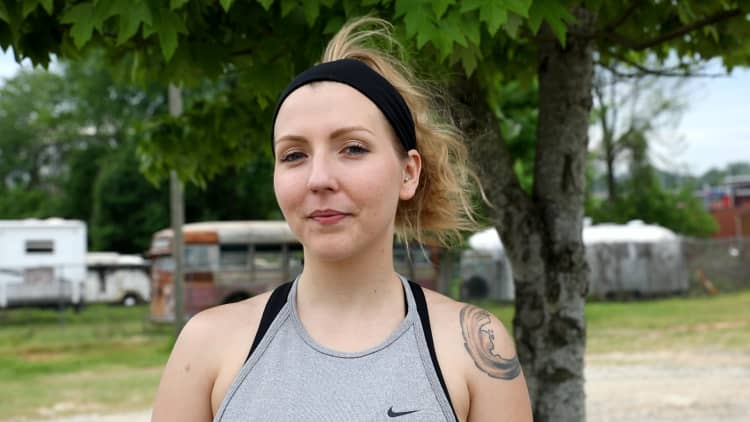Are you in a relationship? Do you and your partner handle your finances together? If so, please take this quiz on "Money and Relationships" to potentially be featured in upcoming CNBC Make It stories.
This story is part of CNBC Make It's Millennial Money series, which profiles people across the U.S. and details how they earn, save and spend their money.
Chloe Potter, 26, moved to Charlotte, North Carolina, nearly two years ago. She'd been living at home in Boca Raton, Florida, after graduating from college and was ready for a change, she tells CNBC Make It: "I wanted to be in a space that I could make mine and start my own life."
She considered big cities like New York, San Francisco and Los Angeles, but the cost of living was too high.
"I ended up doing a bunch of research and finding out that Charlotte was a growing city with a lot of job opportunities," she says. Plus, it's a place where she felt she could "make it work financially."
She borrowed $1,000 from her grandmother to make the move and couch-surfed for a few months while job searching. She landed a 9-to-5 job at a mortgage company and waited tables on the side to save enough money to pay back her grandmother and rent an apartment.
Today, Potter works at a small start-up, spends her spare time growing her side hustle and shares an apartment in NoDa, Charlotte's art district, with her partner.
What she earns
Potter makes $38,000 a year working as a loan expert for the Charlotte-based start-up Loan Boss. Her hours are flexible — she's in the office from 8:30 a.m. to 4:30 p.m. — which allows her to spend time on her passion and side hustle: Levitate, a small-batch coffee roasting company she started in June 2018.
"I spend anywhere between 10 and 20 hours a week on Levitate, depending on how many orders I get," says Potter. "It can be exhausting, but it's totally worth doing something that your heart is completely invested in."
She's not yet concerned about the company making money: "I don't expect to profit from my business until at least three to four years in. I feel like the first few years when you're opening your business, you're experimenting — you're figuring out what works and what doesn't work." Her long-term goal, though, is to open a coffee shop.
"One day, I want to wake up and walk down the street to my own store where people come and enjoy something that I've made by hand," Potter says. "I want it to be a place of solace for people, where they can work or enjoy their friends, like coffee shops have been for me."
What she spends
Here's a breakdown of everything Potter spends in a typical month.
Rent: $580
Potter pays $580 for her share of a one-bedroom apartment that she splits with her partner. A parking spot is included in their rent.
Food: $400
Potter spends around $400 a month on food. Between groceries and eating out, she and her partner, who are both vegans, spend about $800 a month total.
Previously, Potter and her partner each paid around $600 a month, or $1,200 total, but after canceling their meal service, their total food costs went down.
"We're not the most cost savvy," she admits, but eating healthy is important to them. "We splurge on the food that we are putting inside of our bodies. We go to Whole Foods and Harris Teeter, and we buy a lot of organic fruits and veggies and protein supplements to fuel these busy lives that we have. But it does get expensive."
Transportation: $170
Potter inherited her 2007 Kia Sportage from family, so she isn't paying off a car loan. Between gas, which costs $30 to $40 a week ($120 to $160 a month), and the occasional oil change and other maintenance, she spends about $170 a month on transportation.
Subscriptions and memberships: $120
Working out is just as important to Potter as eating healthy. She pays $100 a month for her membership at Five Rings, a strength and conditioning gym in Charlotte.
"It is a little bit expensive," she says. "You can go to some place like LA Fitness and spend $30 or $40 a month, but we get really great training at Five Rings. It ends up being worth the money."
Other subscriptions include Spotify and iCloud. She uses her mom's Netflix account, and her mom also pays her phone bill.
Business expenses: $160
Expenses for her coffee company fluctuate each month, Potter says. "I can spend anywhere between $30 and $400, depending on if I need to order new product. Some months I don't need to order any product and all I have to do is pay state tax."
Besides ordering beans, she also pays for packaging supplies, like bags and labels, and equipment, like coffee roasters.
"Some months are great and inexpensive. Other months I'm like: Crap, we can't go out and get drinks with our friends. We have to hunker down and buy this product for the business," says Potter.
Everything else: $295
- Utilities and Wi-Fi: $125
- Car insurance: $90
- Pet food and maintenance: $80
Climbing out of credit card debt
Potter owes about $7,000 in credit card debt that she's racked up from big expenses, like traveling and moving apartments.
"Debt is super stressful because it's always looming over your head," she says. Potter puts at least $350 every month toward paying off her credit card. "I definitely make it a point to pay more than the minimum."
Her goal is to be debt-free in the next couple of years but she's worried about staying out of the red: "I feel like once I get out of credit card debt, I'll just be getting into more debt, having and growing a business."
Living paycheck-to-paycheck
"I don't really have any money in my savings account right now," says Potter, who used the few hundred dollars she had in savings to cover the expenses that came up when she moved in with her partner last year.
Potter used to have about $1,000 in a 401(k) plan from her first job in Charlotte, but she cashed out after she quit to cover living expenses in between jobs. Her current company doesn't offer a retirement plan, and she has nothing stashed away for the future.
"I hope to have retirement savings from working full-time and owning a small business," she says, "but I don't think having savings is as easy as it used to be."
Potter also doesn't have healthcare right now because it's not offered through her job: "I need health insurance but I can't afford it with a growing small business and living expenses."
"Spending $200 a month for moderate insurance is just not affordable," she continues. "Sometimes you have to forego those things to make other things work. That's kind of the disadvantage of spending extra money that you have on your own business."
What the experts say
CNBC Make It asked Andrew Westlin, a certified financial planner at Betterment, to comment on what Potter is doing well and how she could improve. Here are his thoughts.
She should prioritize an emergency fund
Potter's top priority should be saving at least one month of her living expenses, says Westlin: "Having an emergency fund is crucial. It's the backbone of any strong financial plan." Plus, "Having that money saved up prevents you from having to tap other sources, like going further into credit card debt or withdrawing from your 401(k) plan, like Potter did when she moved."
Ideally she'll build a fund that can cover three to six months worth of expenses, but "starting with one month helps develop good savings habits," he says.
Potter may have to adjust her lifestyle to build a rainy day fund, he notes: "While it might be tough to cut back in some areas of her spending, there's really no better time to do it than when she's young and doesn't have any dependents."
To free up some cash flow, she could try spending less on her food bill, for example, or cut out one of her subscriptions. "Having an emergency fund will help give her breathing room to get out of debt, to afford health coverage and, in the future, help her to take her business to the next level," says Westlin.
She could consider doing a balance transfer
Westlin recommends Potter explore a balance transfer, which is when you transfer credit card debt to another card that offers 0% interest for a period of time, generally 18 months.
"If Chloe were to transfer her $7,000 balance to a card where she pays 0% interest for 18 months, it would allow her to lower her monthly payment for that period of time," says Westlin. That would free up cash that she should direct toward an emergency fund.
Plus, she could save up to $1,200 on interest, he says.
There are some drawbacks: Credit card companies typically charge a 3% balance fee when you make transfer, meaning Potter would owe around $200. "For someone who needs to find a way to free up cash flow this is a good option," says Westlin. "Her credit card debt is not insurmountable and by doing a balance transfer and also focusing on cutting her budget, she could get a handle on the credit card debt before it spirals out of control."
It's worth it to cut back to afford health insurance
Westlin advises Potter to make room in her budget for health coverage: "Having health insurance prevents you from having to pay these astronomical healthcare costs out of pocket. If her employer isn't going to offer it, she needs to get coverage elsewhere."
While it's going to cost $200 to $400 a month, depending on the plan she chooses, "think of that as your emergency fund that saves you from having to pay 10 times that if you do end up having to go to the doctor or the hospital. It's just there to prevent these massive steps backwards."
It can be a little bit of a burden if you have to find your own health insurance, Westlin notes, but resources like Healthcare.gov can help you weigh different options.
She still has plenty of time on her side
While Potter doesn't have any savings right now and is still climbing out of debt, she, or anyone else in a similar situation, shouldn't feel doomed, says Westlin: "She's young. She's got a lot of time on her hands."
If she can pay off her debt and start directing the $350 she puts toward paying off her credit cards toward savings, "that can add up really quickly," says Westlin.
"She's clearly motivated and has a go-getter personality," he says. "She not only has a 9-to-5 job but also has a side hustle and a passion she's pursuing, which, above any of the quantitative things around finances and savings, that's just a good personality trait to have."
Editor's note: This story was revised after Potter provided updated numbers for her food expenses, which are now $400 a month, rather than $600.
What's your budget breakdown? Share your story with us at makeitcasting@nbcuni.com for a chance to be featured in a future installment.
Don't miss: This 27-year-old making $80,000 wants to triple his income in a year—here's how he spends his money
Like this story? Subscribe to CNBC Make It on YouTube!




